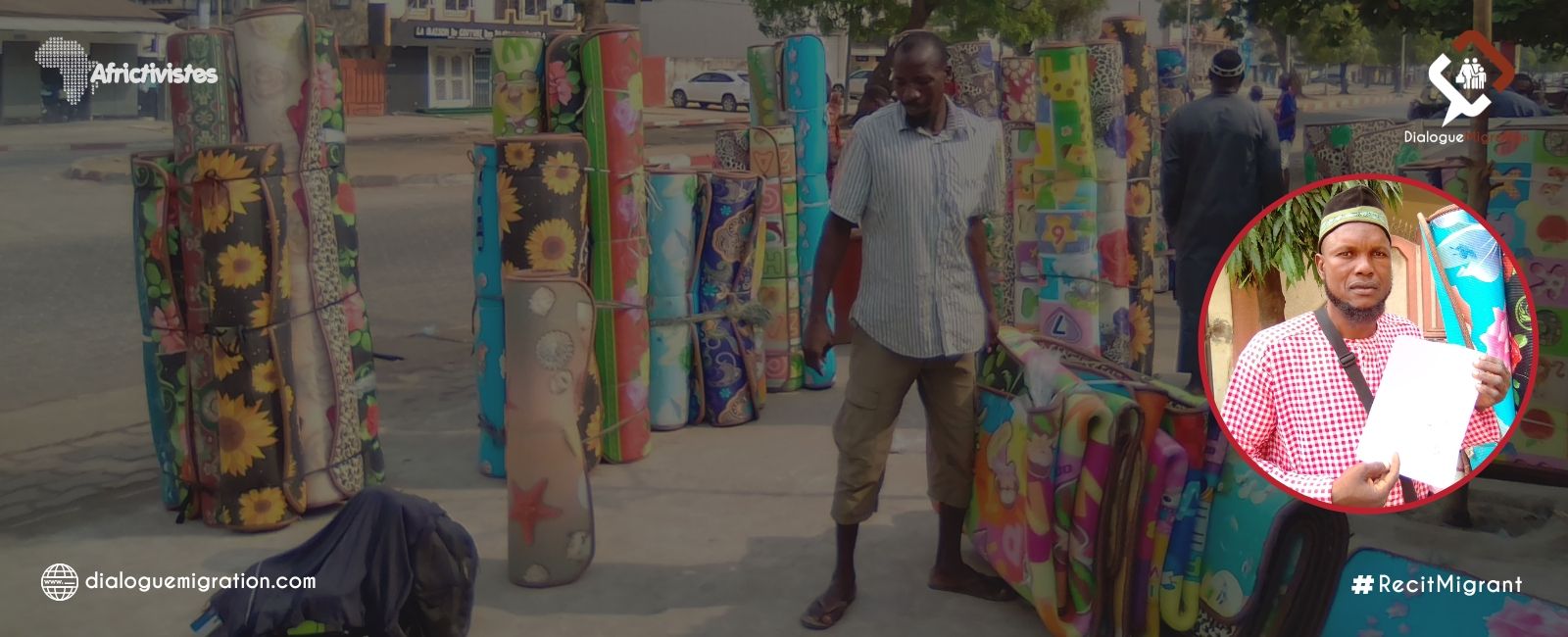

In Benin, non-nationals contribute to the country’s economic activity. This in areas sometimes abandoned by the natives, or in which they are not very present. The activity of these different communities has a remarkable impact on the country’s economy. However, it is not perceived by many people. Dialogue Migration through this survey, notes the economic impact of non-nationals in Cotonou, Benin.
Of Nigerien origin, and resident in Benin, Arouna is one of the wholesalers of plastic mats that he imports from neighbouring Nigeria. Coming to his warehouse, located not far from the Red Star in the 8th arrondissement of Cotonou with a customer, he shows the latter his new arrival. In total, 540 pieces of which cost him 216 thousand CFA francs. “I paid the customs, also the transport for its routing … ” he says, with supporting documents.
The main mosque of Cotonou is in the Zongo district, in the 5th arrondissement of Cotonou,. It is here that Ibrahim Abdallah, a Nigerien national, sells second-hand laptops commonly known as “Venus de France”. This district is renowned for being an open-air shopping centre full of a multitude of nationalities. “We are in order,” says Ibrahim Abdallah. Indeed, the rental is paid, the municipal duties and the tax as well. “You must have noticed that we have a plate with the Ifu number,” he says. On the rail side, Adamou, a Nigerian, sells, among other things, household materials and furniture. He maintains that he pays his public domain occupation fees for goods displayed in front of the three shops he rents. He displayed a municipal payment receipt at the entrance of one of the shops amounting to 3/4 paid at this time of the year (120 thousand CFA francs).
In this commercial area located in the Zongo district, the rental of shops varies between 50,000 CFA francs to 80,000 CFA francs, per month. The use of the public domain and the use of public signs are invoiced by the town hall. The tax service is responsible for collecting taxes. “Last year, it was around 50,000 CFA francs, for taxes,” says one of the tenants. This rule, according to him, applies to all without distinction.
“When they come, it’s not to ask if we are Beninese or Nigerian. The main thing for them is that we have a business and that we have to pay taxes,” admits Abdoul Kadri. Most of the companies in this area, depending on the users, are 99% foreigners. “If you look closely, you will see that it is totally a commercial area. A shop can earn an average of 100 to 200 thousand francs per day. Imagine the number of shops there are… ”, says Abdoul Kadri to Dialogue Migration.
Cotonou’s Dantokpa Market, the largest open-air market in West Africa, lists a multitude of nationalities including Nigerians, Ghanaians, Togolese, Ivorians, Lebanese and Indo-Pakistanis. A study on the import of used vehicles in Cotonou, reveals the control of this activity by the Lebanese according to the European Review of International Migration (REMI). However, if in the city, private companies are owned by Beninese, there are companies of foreign origin, mainly French, Asian, Lebanese and others.
Economic impacts …
None of the official sources, including the National Institute of Statistics and Demography (INStaD) and the Town Hall of Cotonou contacted, did respond to the requests of Dialogue Migration on the economic activity of non-nationals in Cotonou, after several reminders.
Evoking the activity of non-Beninese communities, including Nigeriens who work in small businesses or who are merchants, their movements participate in integration with positive impacts on the economy, notes Professor Joseph Saguy. He is a research professor at the Department of Sociology-Anthropology of the University of Abomey-Calavi in Benin, Specialist in cross-border migration issues in sub-Saharan Africa.
“When they come here, Nigeriens are in small shops. They are everywhere…The economic consequences are largely positive. They participate in economic development through the various activities they carry out. When they come, sometime later, they rent space. They don’t build. Economically it is money that they spend,” explains the academic.
According to him, although they repatriate their profits to their country, buying food locally contributes to the economy.
“Today,” he continues, “there are more than a million Nigeriens here. Those who come and open “shops” by the side of the road, they sell and people buy. So, on the economic level there are positive consequences, “says the teacher-researcher.
As for the Lebanese and Indo-Pakistanis who have department stores at the Dantokka market, he notes, “they sell mostly wholesale and cheaper. Our parents buy and sell in detail; which allows them to earn a little.” At the economic level, on the domestic level the consequences of immigration are largely positive, he concludes.
However, there are negative assessments of the activities of certain communities, particularly the Lebanese. They are sometimes accused of monopolising many sectors of the national economy, including the trade sector, where they are both wholesalers and retailers despite the existence of laws.


